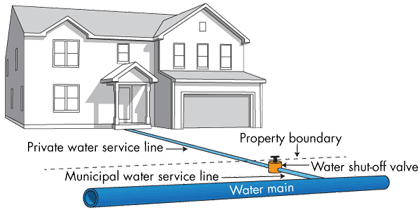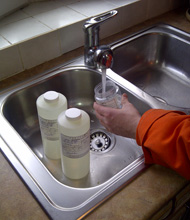Become a community lead testing volunteer
Help safeguard our water, from source to tap
We’re proud of our drinking water. It exceeds strict Ministry of the Environment water quality standards and meets provincial regulations to ensure our water distribution system performs at a high level.
A shared responsibility
Protecting our drinking water is a shared responsibility. Everyone has a role in keeping our water safe and clean.
While the City of Kingston owns the infrastructure and Utilities Kingston proudly operates it to a high level of standard, local businesses and residents are asked to do their part too.
For example, businesses must comply with the Cross Connection Control Program and residents are asked to conserve their use of treated water.
Another way you can help protect our water is to volunteer in the provincially-regulated Community Lead Testing Program.
What is lead?
Lead is a soft metal that is mined from rocks and soil. It is a long-lasting metal that has many useful purposes. Unfortunately, lead is also toxic and can be found in many sources including food, air, dust, dirt, and water. Learn about the potential effects of lead on human health (Health Canada) and from the Kingston, Frontenac, Lennox and Addington (KFL&A) Public Health website.
About lead pipes and solder
In most of Canada, the amount of lead in natural water supplies is very low. As the water leaves treatment plants, we regularly test it according to Ministry of the Environment standards and know that the water leaving the Kingston water treatment plants is completely lead free.
However, lead can enter the water supply from old lead service lines (pipes) or lead solder in the plumbing in your home. As well, the brass in some plumbing fixtures can contain high percentages of lead

A home’s water service line
Homes built before 1950 often have lead service lines since the metal was commonly used to supply water to Canadian homes before then.
Lead solder was used for plumbing until 1990 when the National Plumbing Code of Canada no longer allowed the use of lead solder in new drinking water plumbing or in repairs to existing drinking water systems.
The amount of lead leached into drinking water will increase as water sits in pipes or if the water is very soft or very acidic.
One way of reducing exposure to lead in drinking water is by replacing lead service lines with newer materials, such as copper or plastic, that do not contain lead.
Seeking volunteers
We test the water in Kingston homes and businesses for lead every six months.
The City of Kingston seeks residents and business owners who are interested in participating in its regular volunteer-based Community Lead Testing Program. If you volunteered in the past, you may also be contacted by Utilities Kingston for voluntary follow-up testing.
Under the provincial regulation 170/03 (Safe Drinking Water Act), the Ministry of the Environment requires owners of municipal residential drinking water systems to conduct lead testing of water taken from both plumbing (pipes inside the home or building) and distribution locations (pipes leading to the home or building).
We select volunteers at random from properties that are located in an area likely to have services with lead. These include:
- buildings that were built before 1950
- homes built prior to 1990 with non-lead service pipes, but having plumbing with suspected lead solder
Become a lead testing participant and help safeguard our water.
We test the water in Kingston homes and businesses for lead every six months. Interested residents and business owners can contact Utilities Kingston customer service at 613-546-1181.
The testing process
Here’s what a Certified Water Treatment Operator with Utilities Kingston will do when they visit your home or business to test your water:
-
Flush the faucet that is most often used for drinking water (usually this is a kitchen faucet)
-
Let the water stand in the plumbing for 30 minutes; during this time we ask that occupants not use any water
-
Take three samples of water
-
Our Certified Water Treatment Operator will take the samples and drive them to an accredited chemistry lab for lead testing
-
Within a week of receiving the test results, the building owner and/or tenant will be informed of the results, and whether or not lead is found in the samples.

If lead was found in any samples, we will inform the property owner and/or tenant and answer any questions they might have.
And remember, Utilities Kingston employees always carry identification. You should ask to see it before allowing anyone into your residence or business.
To learn more about Utilities Kingston’s Community Lead Testing program, call our Water Quality Office at 613-546-1181, extension 2291.
Want to do more to help safeguard our water?
You can also help protect source water and our water and wastewater distribution system by keeping contaminates like fats, oils, chemicals, and pharmaceuticals out of the sewer. Never flush these items.
Related resources
Do you have lead pipes in your home? Find out in under 10 minutes - (© NPR 2015)
